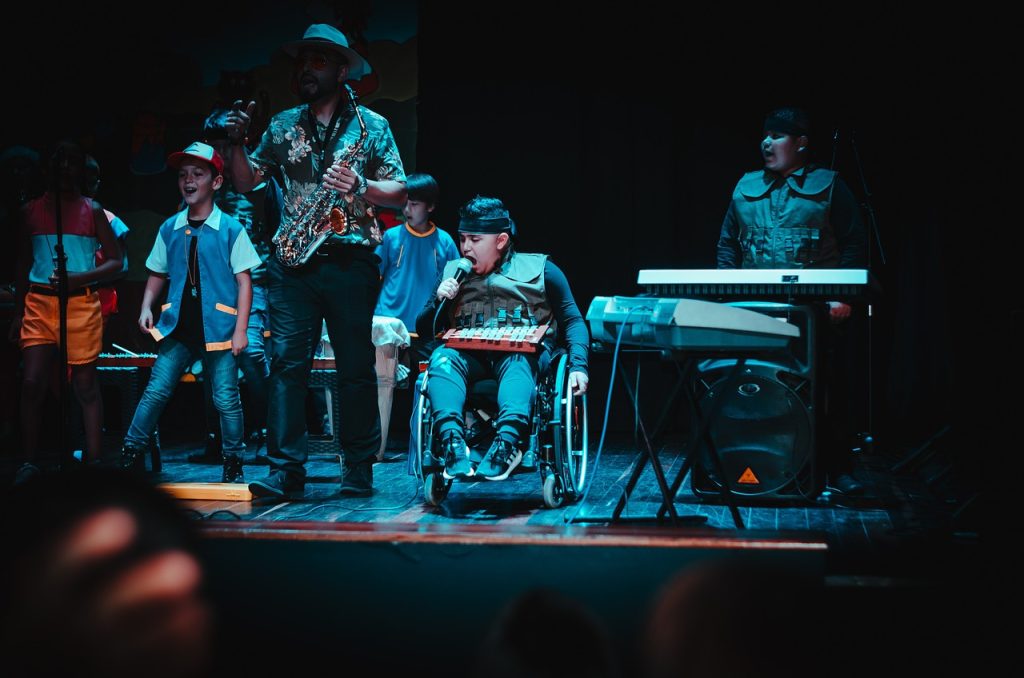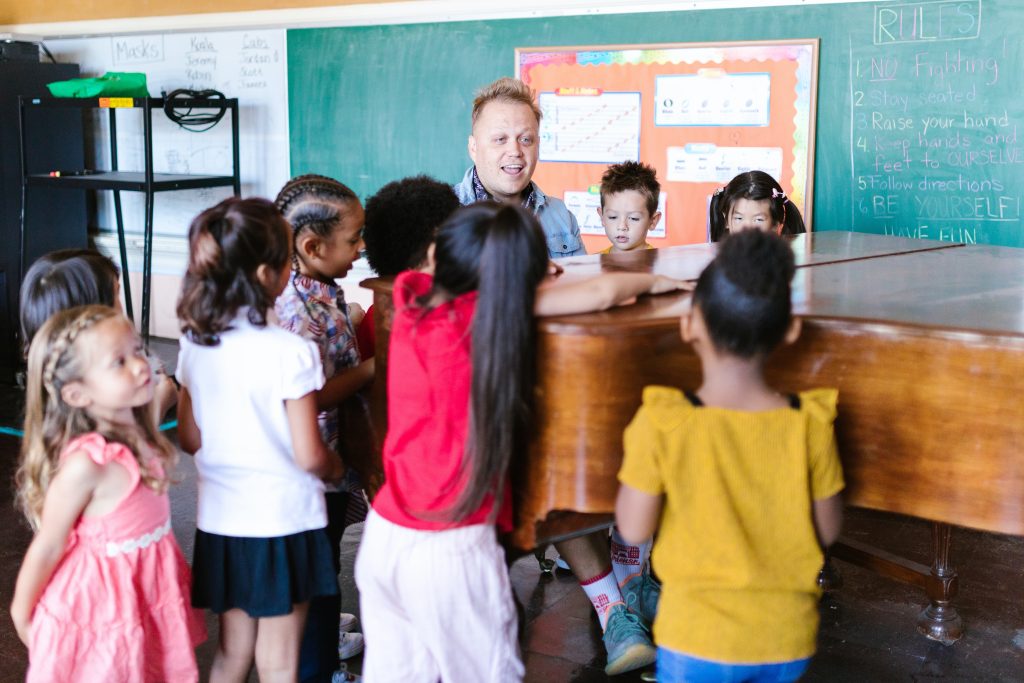Musicking in a group is like strengthening your success!
- Marie-Claude Mathieu, Doctoral candidate in education, Université Laval
- Isabelle Héroux, Professor at the University of Quebec in Montreal
- Valerie Peters, Professeure at the Laval University

Playing music in a group often brings people together in moments of joy and celebration. Who hasn’t felt a sense of connection singing around a fire or joining in on a group “Happy Birthday”? For both young and old, the collective practice of music not only fosters a sense of community but also provides a myriad of emotional and social benefits. So, what hidden benefits lie behind the act of making music in a group for our youth?
Music is a powerful tool in a child’s development. It influences their growth, success, and well-being within the school environment. Whether explored in a formal academic setting, through extracurricular activities like choirs, orchestras, or jazz bands, or even in an after-school setting—think pop-rock group workshops in music schools—the opportunities for young people to immerse themselves in collective musical experiences are diverse. Moreover, group music, by its nature, engages individuals’ socio-emotional skills in a unique way, skills that resonate in various aspects of life.
In the following lines, we explore how group musical practice proves to be a valuable ally for the overall development of young people, socially, cognitively, and academically.
Tangible socio-emotional benefits
Several studies suggest that making music in a group nurtures the development of socio-emotional skills. As an activity based on collaboration, requiring continuous interaction and coordination among participants, it acts as a catalyst to strengthen interpersonal relationships. In this context, participants are not only encouraged to collaborate but also actively share their knowledge and skills, creating an environment of mutual learning. For example, group music classes have been observed to enhance the social cohesion of children with weaker social skills by stimulating empathy and reinforcing prosocial behavior [1].
In another study, young people from low-income families significantly improved their relationships with teachers after participating in a percussion workshop for a term, facilitated by a school instructor [2]. On the other hand, some parents testify that their children’s involvement in music programs has enriched family bonds, allowing older siblings to model positive engagement for their younger siblings or sharing quality moments during concerts [3]. Finally, toddlers exposed to group music activities in daycare demonstrated better emotional management and understanding compared to those not exposed to musical interventions [4].
Playing music in a group requires concentration and active listening from musicians to constantly adjust their performance to that of their peers. This inherent discipline promotes individual accountability, as each musician plays a crucial role and must invest in collective success. In this regard, parents have noted increased responsibility in their children, extending beyond music and reflecting in other areas of their school life. Children, in turn, express that music teaches them patience and commitment to their musical ensemble [3].
Group music classes are also a fertile ground for the development of synchrony, the simultaneous execution of a series of events or actions, be they biological, behavioral, or emotional. Making music provides a rhythmic framework that facilitates the coordination of simultaneous movements, whether strumming the strings of a ukulele, beating drumsticks on a drum to reproduce the same rhythm, singing the same note, or expressing the same emotion while interpreting a song. Some studies have established a connection between synchrony in parent-child interactions and several positive aspects of child development, such as mental health, moral and emotional development, as well as positive behaviors [1]. In this sense, activities that encourage high levels of motor synchronization, such as group singing and instrumental play, enhance cooperation and well-being in both children and adults.
Notable benefits on cognitive skills and academic success

In addition to obvious prosocial benefits, making music in a group contributes to cognitive development and overall academic success. A study demonstrated that participation in a two-year intensive music program significantly improved both auditory and visual short-term memory in elementary school children [4]. Researchers attribute this improvement in musician participants to the use of more effective encoding strategies, optimizing the ability to transform information (such as an image or sound) for translation and storage, similar to how a computer functions. This effect is not limited to children; it has also been observed in adults participating in similar programs. For young children, group musical experience, by providing an environment rich in stimuli distinct from their usual home context, promotes the use of communicative gestures that will emerge later in their development [5].
Furthermore, engaging in collective musical activity would positively influence the academic success of young people. Indeed, parents of children who participated in an after-school music program observed improvements in their children’s concentration, attention, and time management skills—factors contributing to increased academic performance [3]. In essence, the activity itself, whether practiced by novices or more advanced musicians, simultaneously enhances their musical skills.
A better quality of school life
Engaging in collective musical activity is often correlated with an improvement in the quality of school life for many young musicians. According to a study involving children participating in a musical program with an average of 4 hours of music classes per week, overall satisfaction with school was highlighted [6]. This overall satisfaction with school is attributed to the fact that the musical learning process extensively exposes children to critical thinking, particularly required during the interpretation of a piece (involving active listening, reflection, and adjustment to improve performance), thus nurturing a sense of positive accomplishment. Moreover, young people state that participating in a music program provides them with more opportunities to thrive in school, such as through various projects or concert preparations. Music programs also allow young people to experience rich emotional and aesthetic experiences that prove to be positive components contributing to a high-quality school life.

Furthermore, participants in the intensive music program reported greater satisfaction with the atmosphere in their class compared to students in other programs. Participation in group musical activities strengthened students’ sense of belonging and pride. Indeed, sharing a common goal establishes a team spirit that increases the enjoyment felt in class. A good classroom atmosphere also translates into a fulfilling “teacher-student” relationship. Thus, young people described the relationship as fair and just, which could be linked to how the teacher distributes various responsibilities within the group.
In conclusion, group musical practice among young people not only plays a role in the development of prosocial and cognitive skills but also contributes to improving the quality of school life. After all, being part of an ensemble where all musicians must synchronize to sing or play in harmony provides a sense of belonging and joy that transcends all expected benefits. After all, rhythm is life!
Also worth knowing
Children facing attention difficulties generally respond well to group music interventions.
The brains of toddlers are particularly receptive to the musical experience.
The acquisition of musical skills, cognitive development, and social interaction do not function in isolation but mutually influence each other. Thus, music is one means of contributing to the overall development of children.
Our Advice
When to start music lessons? With toddlers, it is preferable to choose music appreciation classes with a parent-child approach.
- When the parent is actively involved, and the approaches and materials used are appropriate, music education can start from early childhood.
Use songs to impart values to children.
- Songs are excellent vehicles for conveying values. In addition to the existing repertoire, they can be composed to address specific needs.
Favor or prioritize participation in programs or courses that span over time. Indeed, it has been demonstrated that benefits are more significant when programs have long-term goals and frequent engagement.
References
- Schellenberg, E. G., Corrigall, K. A., Dys, S. P., et Malti, T. (2015). Group Music Training and Children’s Prosocial Skills. PloS one, 10(10). https://doi.org/10.1371/journal.pone.0141449
- Ho, P., Jennie C. I. Tsao, Lian Bloch, et Lonnie K. Zeltzer. (2011). The Impact of Group Drumming on Social-Emotional Behavior in Low-Income Children. Evidence-Based Complementary and Alternative Medicine, 2011. https://doi.org/10.1093/ecam/neq072
- Whitson, M. L., Robinson, S., Valkenburg, K. V., et Jackson, M. (2020). The benefits of an afterschool music program for low-income, urban youth : The music haven evaluation project. Journal of Community Psychology, 48(2), 426‑436. https://doi.org/10.1002/jcop.22263
- Degé, F., Wehrum, S., Stark, R., et Schwarzer, G. (2011). The influence of two years of school music training in secondary school on visual and auditory memory. European Journal of Developmental Psychology, 8(5), 608‑623. https://doi.org/10.1080/17405629.2011.590668
- Gerry, D., Unrau, A., et Trainor, L. J. (2012). Active music classes in infancy enhance musical, communicative and social development. Developmental Science, 15(3), 398‑407.
- Eerola, P.-S., et Eerola, T. (2014). Extended music education enhances the quality of school life. Music Education Research, 16(1), 88‑104. https://doi.org/10.1080/14613808.2013.829428